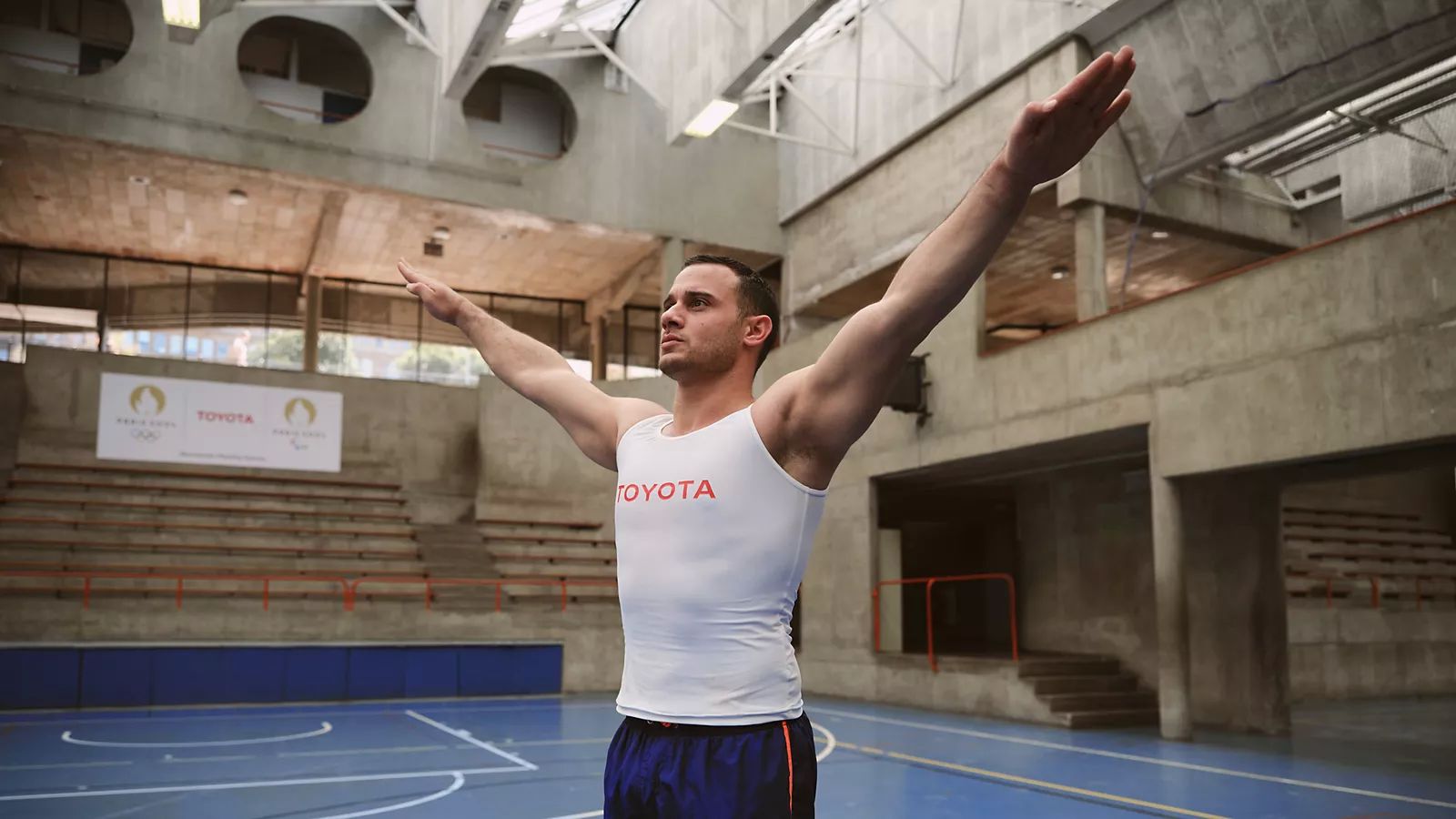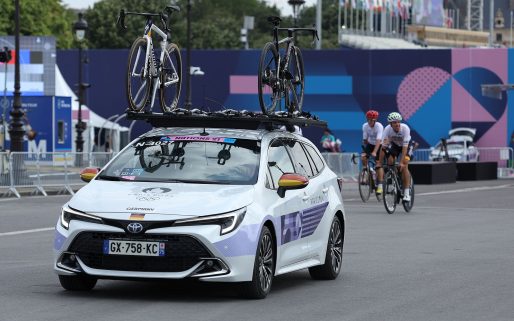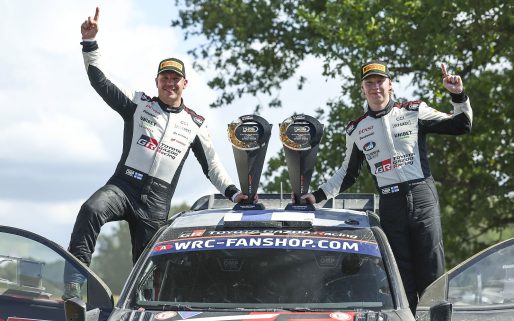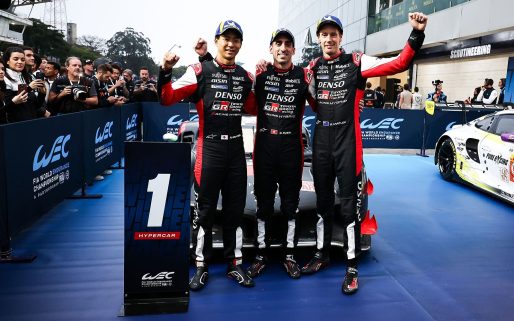Toyota believes that small steps add up to substantial forward leaps. It’s a philosophy that resonates with many individuals across a wide variety of endeavours and occupations, a small selection of whom we have interviewed for this new ‘Beyonders’ series.
Each of the five extraordinary individuals will explain how they have taken steps beyond what anyone thought possible, leading to amazing outcomes that we hope will inspire others to become ‘Beyonders’ too. The series continues with Olympic gymnast Samir Ait Said, who went beyond all expectations to become European Champion after serious injury.
Beyonder: interview with Samir Ait Said
What made you want to become an athlete?
Samir Ait Said: I had loads of energy when I was a kid, running and jumping around and being a complete nightmare at school. So my dad was convinced that I needed to get into a sport. He wanted me to do judo but I was doing gymnastics at school, and for me that meant being on the trampoline. That’s how I got into the sport.
What does it feel like to perform a routine at the Olympics?
SAS: It’s a really proud moment because you’ve worked so hard to get to the Olympics, and to be able to say that you’re representing your country at the Games… well, it’s incredible. Huge. You’re just so focused on the routine, on not getting distracted, so you can perform the very best you possibly can. And then when you’ve finished, you just feel pure joy.
What’s your daily routine?
SAS: Funnily enough, I often don’t get much of a choice when I get up; it’s my daughter who decides. I might have had a really tough day training the day before and decide that I need a bit more sleep so I’m on form for training. But madam decides differently. She’s the boss. After taking her off to nursery I’ve got conditioning training with my coach. Then I’ll go home and eat, maybe try to have a nap, before getting back to technique training where I stick to the apparatus, mainly the rings. As soon as we’re done, I’m off to collect the monster from nursery and go back home. But if I’ve got any minor injuries I might also squeeze in a physio session.
What are some of your career highlights?
SAS: Let’s start with the first at senior level, which was back in 2012. I broke my knee just before leaving for the Olympic Games in London and had to have an operation. People saw my injury and said that it would be hard to come back from this. Although it meant no Olympics for me that year, I really wanted to come back strong and qualify for the European Championships in Moscow. So I fought hard, qualified, and finished as European Champion. For me, that was an incredible personal victory.
The second highlight wasn’t that long ago. We were at the 2019 World Championships in Stuttgart, which was a qualifying event for the 2020 Tokyo Olympics. And the only way for me to get a place in Tokyo as an individual was to win a medal. So I’m watching the others go before me, doing these crazy routines. And then the penultimate one, right before me, was the reigning Olympic Champion. He smashes his routine and it puts him into third place. Which means the only way for me to qualify for the Olympics is to beat the current Olympic Champion.
I had a crazy amount of adrenaline running through my body and was feeling the pressure. But I said to myself, ‘This is your moment; it’s yours for the taking.’ And that’s what I did. I beat the Olympic Champion, got my medal and went to the Tokyo Olympics. That was a really great moment for me and my career.
What’s been your most difficult moment and how did you overcome it?
SAS: There have been a few and, I won’t lie, there’s another that I’ve really struggled to overcome. The toughest moment of my life was losing my dad after the Rio Olympics in 2016. It was really hard, not something you can ever overcome, but one that I’ve had to learn to live with. I just continue fighting because I made a promise to him to go and get that medal. It’s about believing, never giving up. So I’m going to get that medal whatever it takes – for him, for me, for my family and for everyone who believes in me. I have to fight for it. You can’t let a few difficult moments make you give up.
What’s the most important lesson you’ve learned so far in your career?
SAS: That sometimes people won’t necessarily believe in you or think that you will succeed. But the most important thing is that you believe in yourself. You’ve got to have faith, fight for yourself and reach your goals.
What does success look like to you?
Samir Ait Said: I think it’s about gratitude, for one thing. If you do well in a competition you need to know how to enjoy the moment for what it is. Maybe you can relax a bit, let go, but only until your next goal. For me, I like to celebrate my success with the people around me – loved ones and those who believe in me, my coaches, my trainers, my partners. It’s a team thing.
Do you have any advice for people on how to give their best?
SAS: I’m repeating myself a bit but I’d say the same thing – believe in yourself, fight, and give it your all. If you don’t succeed first time it doesn’t mean you won’t get there in the end. Even a lion is a failure 80% of the time when he’s out hunting, so what is it that still makes him a king? His perseverance. And I love that.
What does it mean to you to ‘go beyond’?
SAS: For me, going beyond means working hard. Not being scared of going for it. And to carry on going despite being scared. I’m going to link it back to my injury when I broke my leg in two in an accident on the vault. Obviously it scared me to think that my leg was broken. I was worried that it would hurt, and that I wasn’t going to be able to carry on. But I didn’t stop. I was scared but I faced my fears and my doubts. That’s how I see it anyway.
What three important factors help you ‘go beyond’?
SAS: I’d say family, training and failure. The first is my family. Every moment with them means so much because it gives me my energy. Training means a lot to me, too, because it means I’m moving forward, getting stronger and more experienced. And I also think that every moment of failure helps me improve. Every time I lose, every time I fall, it makes me stronger because I want to forge ahead.
What makes you feel ready for a big event?
SAS: I don’t think you ever feel truly ready for big events. But when you know you’ve given your all and you’ve worked hard to be at the top of your game, then you know deep down that you’re ready. After that it’s just adrenaline making you have a million doubts.
What small victories have helped give you more confidence in yourself?
SAS: One small victory that gave me confidence was when I managed to walk again without crutches. I felt like a child taking its first steps. I honestly felt amazing, like a grown-up. Years later I still remember it, so it really had an impact.
When you’re competing, what little detail has made or can make the difference?
Samir Ait Said: Hmm… I have to go back to my daughter. When I see her, I feel like she gives me a bit more energy, a bit more strength. So whenever I’m stressed or have any doubts about a competition I video call her, and she tells me to ‘Go on, dad. Go on!’ You can’t give up after something like that. You’re forced to succeed!
How do you relax before a competition?
SAS: I usually watch a film to help settle myself. Although, I don’t want to get to a competition feeling too relaxed because I need to have plenty of adrenaline on the day. So half an hour or an hour or so before, I’m up. That’s when it’s time to really get into it.
What is the best piece of advice you’ve been given?
SAS: I think my parents gave me the best advice: do what you love. It says nothing and everything at the same time. Don’t force yourself to do something you hate. Make sure you do something you love. You’ll be better at doing it anyway. Everyone knows that.
What’s your last thought right before performing?
SAS: I think about the people close to me, everyone who’s helped me get to where I am today. I think of them because it’s not possible on your own. Anyone who says they don’t need others is lying. We all need someone.
What’s your guilty pleasure?
SAS: I need to be careful what I say but I think I’d say food. Although, to tell you the truth, it’s actually sweets. I’m a big kid at heart.
Finally, what’s your perfect day out of competition?
Samir Ait Said: Being with my daughter, watching a good film, going for a walk and having a nice meal. When I come back from training. That’s it.
Read more in the ‘Beyonders’ series:
Billy Monger, racing driver
Ofentse Pitse, conductor
Ken Billes, car designer
Kazuki Nakajima, racing driver




